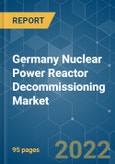The German nuclear power reactor decommissioning market is expected to register a CAGR of around 3.5% during the forecast period. The COVID-19 pandemic did not have much effect on the nuclear power reactor decommissioning market as the ongoing decommissioning projects progressed smoothly without any delays to meet the deadline. During 2020-2021, three commercial power reactors were decommissioned, namely Gundremmingen-C, Grohnde, and Brokdorf nuclear power plants. The German nuclear power reactor decommissioning market is expected to catch a pace in the near future, mainly due to the public safety concerns aroused in the government's vision due to the famous Fukushima disaster in Japan, and secondly, the operational retirement of nuclear reactors in the country. The market can be hampered by the long duration taken by the decommissioning projects.
The German nuclear power reactor decommissioning market is moderately consolidated. Some of the key players in this market include RWE AG, EnBW Energie Baden-Württemberg AG, Energiewerke Nord GmbH (EWN), Orano Group, and E.ON SE.
This product will be delivered within 2 business days.
Key Highlights
- The Commercial Power Reactor segment is expected to witness decommissioning at the fastest rate due to the upcoming decommissioning projects in the country of the type.
- The new German government's strong support for the nuclear power phase-out by 2022 is the biggest opportunity for the market. The country has decommissioned around half of its nuclear power generation fleet by 2021 with fast-tracked government support, and three commercial power plants are going to be dysfunctional by 2022.
- The high growth of renewables in the power generation sector is expected to catalyze the nuclear power decommissioning market in the near future.
Key Market Trends
Commercial Power Reactor Expected to Witness Significant Growth
- A decade ago, Germany had a considerable nuclear power generation installed capacity with all types of nuclear power reactors, commercial, prototype, and research reactors. With the occurrence of the Fukushima nuclear disaster in Japan, many European countries started refraining from increasing the nuclear power generation share in the electricity mix, and Germany was no exception.
- According to International Atomic Energy Agency, the nuclear power contribution to the electricity mix witnessed a staggering downfall from around 17% to 11% in 2020. The German government has pledged to phase out nuclear power completely by 2022. Only three nuclear commercial power plants remain to be decommissioned.
- The three plants currently in operation are Isar-2, Emsland, and Neckarwestheim 2. The total combined capacity of the power plants is 4304MWe. The decommissioning of the nuclear power plants is scheduled for 2022 by the respective developers.
- The fast-paced decommissioning of the commercial power plants is also supported by the currently under-construction nuclear waste repository. This very crucial task is undertaken by the Commission on the Storage of High-level Radioactive Waste. The repository is expected to be constructed by the end of 2022.
- Such kinds of developments are likely to give a boost to the decommissioning of commercial nuclear power plants in the coming years.
Growth of Renewables Expected to Drive the Market
- Renewable energy sources have steadily increased their penetration in the power production of the country in the last decade. The technology development and the favorable policies and programs implemented by the government were the main contributors to the high growth.
- The renewables' share in the net electricity generation mix was recorded as 45.7% in 2021. The German government has set a target to achieve climate neutrality by 2045 and expand the share of renewables in electricity generation to 80% in 2030.
- Wind and solar energy sources have witnessed the fastest growth in the renewable portfolio of the country on account of the concrete steps taken by the government. As an example, in July 2021, the European Union introduced new legislation to help meet its pledge to reduce the gas emissions that cause global warming by 55% over this decade. The plan also includes the expansion of solar and wind power in the North Sea region to reduce the GHG gas emissions in the power sector.
- The Renewable Energy Act (EEG) came into force in January 2021. The law aims at ensuring 100% renewable electricity supply and 100% renewable electricity consumption by 2050, largely with the help of wind energy development. The law favors the allotment of more land for the onshore wind power projects to reach the renewables targets.
- Such developments are likely to fuel the nuclear power reactor decommissioning market in the years to come.
Competitive Landscape
The German nuclear power reactor decommissioning market is moderately consolidated. Some of the key players in this market include RWE AG, EnBW Energie Baden-Württemberg AG, Energiewerke Nord GmbH (EWN), Orano Group, and E.ON SE.
Additional Benefits:
- The market estimate (ME) sheet in Excel format
- 3 months of analyst support
This product will be delivered within 2 business days.
Table of Contents
1 INTRODUCTION
4 MARKET OVERVIEW
5 MARKET SEGMENTATION
6 COMPETITIVE LANDSCAPE
Companies Mentioned (Partial List)
A selection of companies mentioned in this report includes, but is not limited to:
- Vattenfall Group
- E.ON SE
- RWE AG
- EnBW Energie Baden-Wurttemberg AG
- Energiewerke Nord GmbH (EWN)
- Orano Group
- Studsvik AB
- GNS Group
Methodology

LOADING...










